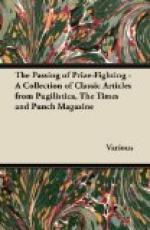CHAPTER II.
This is the Isle of Man, the island of Matt MYLCHREEST, and Nary Crowe, but plenty of vultures, the island of Deemsters, and Keys, and Kirk Maughold, and Port y Vullin. Here at the Lague lived Adam FATSISTER, the Deputy Governor, who had been selected for that post because he owned five hundred hungry acres, six hungrier sons, a face like an angel’s in homespun, a flaccid figure, and a shrewd-faced wife, named Ruth. Hither came STIFFUN, to beg shelter. The footman opened the door to him, but would have closed it had not Adam, with a lusty old oath, bidden him to let the man in. Hereupon STIFFUN’s face softened, and the footman’s dropped; but Orrors, with an Icelander’s inborn courtesy, picked it up, dusted it, and returned it to its owner. Shortly afterwards, STIFFUN became a bigamist and a wrecker, and had another son, whom, in honour of the Manxland Parliament, he christened Michael MOONKEYS, and left him to be cared for by old Adam, whose daughter’s name was GREEBA. STIFFUN, as I have said, was a wrecker, a wrecker on strictly Homeric principles, but a wrecker, nevertheless. When storm-winds blew, he was a pitcher and tosser on the ocean, but, like other pitchers, he went to the bad once too often, and got broken on the rocks. Then came Kane Wade, and CHALSE, and MYLCHREEST, and they sang hymns to him.
“Ye’ve not lived a right life,” said one. “Now, by me sowl, ye’ve got to die,” sang another. “All flesh is as grass,” roared a third. Suddenly Fason stood beside his bedside. “This,” he thought, “is my father. I must kill him.” But he restrained himself by a superhuman effort—and that was the end of Orrors.
The book of Michael MOONKEYS.
CHAPTER III.
Michael and Fason were both the sons of Orrors. They were both Homeric, and both fell in love with GREEBA, who flirted outrageously with both. These coincidences are absolutely essential in a tale of simple human passions. But, to be short, GREEBA married Michael, who had become First President of the second Icelandic Republic. Thus GREEBA and Michael were at Reykjavik. Fason followed, spurred by a blind feeling of revenge. About this time Mrs. FATSISTER took a dislike to her husband.




